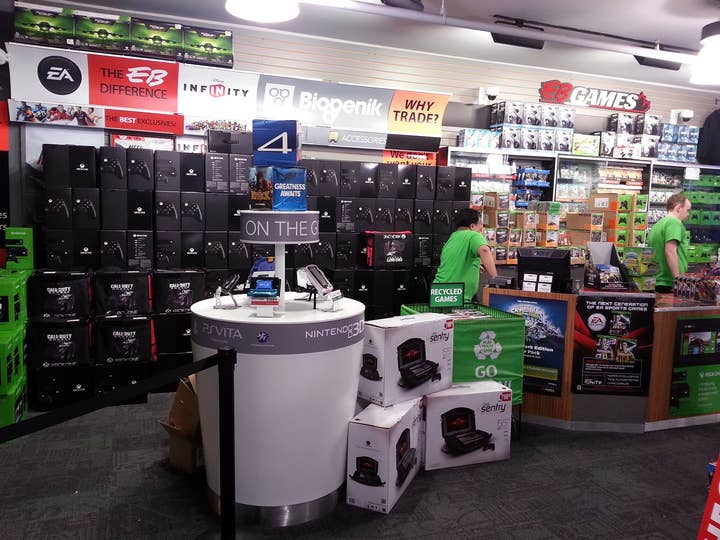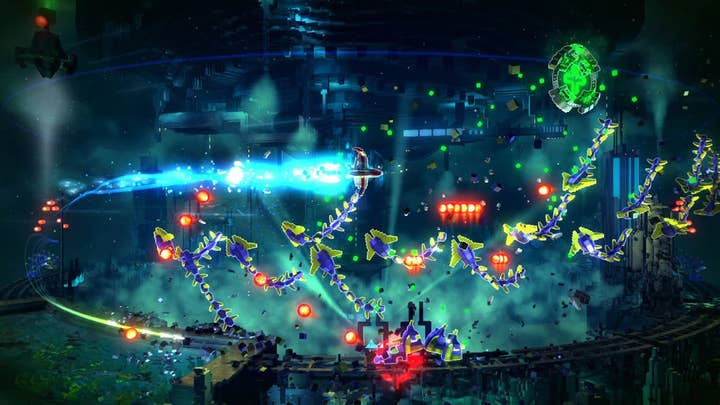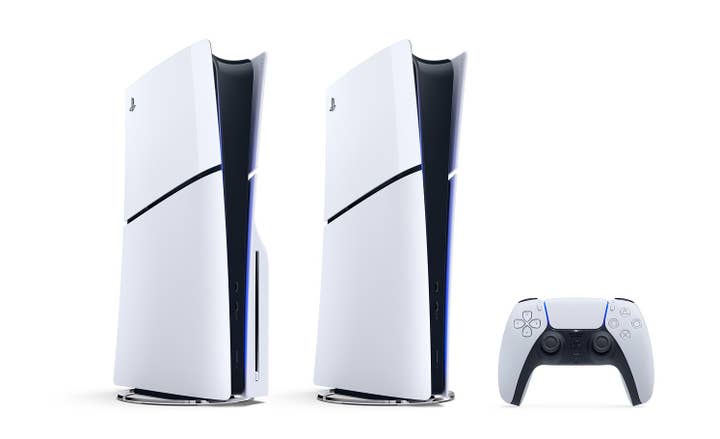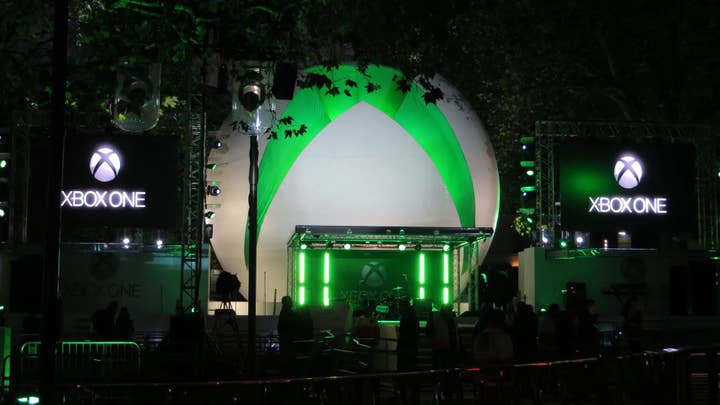PS4 and Xbox One launches underwhelm, but overperform | 10 Years Ago This Month
People were so eager for new consoles they didn't mind waiting a bit longer for games that would justify the purchase
The games industry moves pretty fast, and there's a tendency for all involved to look constantly to what's next without so much worrying about what came before. That said, even an industry so entrenched in the now can learn from its past. So to refresh our collective memory and perhaps offer some perspective on our field's history, GamesIndustry.biz runs this monthly feature highlighting happenings in gaming from exactly a decade ago.
November of 2013 was a big one for games, with two major consoles launching opposite one another after years of discourse about the surely imminent demise of the console market.
There were two big factors driving that discourse, with the most obvious one being the advent of mobile gaming, which certainly seemed to be doing a number on the handheld gaming market given the rough launch of the 3DS and the somehow even bleaker life of the PlayStation Vita.
The other big driver was not exactly invisible at the time, but is still a bit more apparent in hindsight. The Xbox 360 and PlayStation 3 generation was the longest the industry had ever seen. The original Xbox was four years old (and already discontinued) when the Xbox 360 launched. The Xbox 360 was eight years old when the Xbox One arrived.
Motion control gimmicks like Kinect helped Microsoft extend the 360's life, while Sony's growing market share with the PS3 as the generation went on (and lack of interest in burning money to rush a successor to market) helped keep it slightly more patient as well. The PS3 arrived six years after the PS2, and remained the flagship console for seven years until the launch of the PS4.
The industry had never been this deep into a console cycle before, and the one thing we all knew about the console cycle was that enthusiasm and interest flagged toward the end of it.
Add to that the Wii U's unimpressive debut from the year before, and it was no doubt a relief to many when Microsoft and Sony's new systems at least seemed to spark considerable interest at launch.

The PlayStation 4 went first with a November 15 North American debut, and we had coverage and pictures from midnight launch parties in New York, Toronto, and San Francisco. (The UK would have to wait a couple weeks more for the PS4's debut there.) Hundreds waited in line at various stores, cosplayers were out on the streets, braving chilly weather in concerningly inadequate clothing, and Sony plastered stores and landmarks with PS4 branding to make it all seem like a Big Deal.
Microsoft followed a week later with the Xbox One launch, which felt a lot like the PS4 debut, but with shorter lines. However, Microsoft one-upped Sony when it came to celebrities, getting German actors to appear at the Berlin launch while the London even featured rapper Sway and YouTuber KSI, who had been banned from Eurogamer Expo for harassing women at the event, and made "rape face" a running joke on his channel.
This was apparently news to Microsoft, which upon being informed of KSI's prior actions, the company publicly distanced itself from the influencer and said it was not planning to work with him in the future.

There was another influencer foible around the Xbox One launch, but we wouldn't find out about it for two years, when the Federal Trade Commission settled charges with Machinima, which Microsoft had paid to have YouTubers shill the Xbox One around launch. To fulfill its end of the deal, Machinima paid YouTube influencers like Adam Dahlberg ("SkyDoesMinecraft" and "SkyVSGaming") and Tom Cassell ("ProSyndicate") to say exclusively positive things about the system and exclusives like Ryse: Son of Rome, but it prohibited them from disclosing that they were compensated for it. (Microsoft appears to have been unaware of that prohibition and acted to reverse it when it discovered the situation.)
Incidentally, Cassell would run afoul of the FTC again in 2017 for using his channel to promote an online gambling service he co-owned without disclosing his connection to the site, and was later accused of sexual assault by another streamer. Last year, Dahlberg was accused of domestic abuse by an ex-girlfriend and a former employee of his company Sky Media told horror stories of working there, including one time his mom had a heart attack and he wanted time off to visit her but the company threatened to fire him in response.
On second thought, maybe it's for the best that Sony didn't lean into the influencer stuff harder for the PS4 launch.
Back on topic, there was actual excitement around the PS4 and Xbox One launches. Which is mildly surprising, because the two systems didn't have a lot of great launch games to justify that excitement.
Going by our review round-up, the standout hit of the PS4 launch was the bite-sized Resogun, Housemarque's $10 downloadable game inspired by the arcade classic Defender. Much less impressive were the intended stars of the show, Knack and Killzone: Shadowfall.

The Xbox One launch up fared ever-so-slightly better. Ryse: Son of Rome was dismissed as "nasty, brutish, and short," Killer Instinct was too limited in scope with just six fighters on day one, and Crimson Dragon was grounded by complaints over its microtransaction-heavy business model. Forza Motorsport 5 and Dead Rising 3 were the best exclusives of the bunch, with Metacritic averages of 79 and 78, respectively.
The promise of what each system would have coming down the pipe was enough to offset their iffy launches, as both the PS4 and the Xbox One sold more than 1 million units in their first 24 hours on sale.
While the next-gen launches quickly put to bed any nothing that consoles were a dying business, they were providing just as clear evidence that the consoles were evolving.
Longbow Research analyst James Hardiman called the two console launches a "watershed event" because they signaled the arrival of the first generation where all games would be available for download on the day they released. The PS3 and Xbox 360 era began with AAA games shipping exclusively on disc, and for the ones that received a digital release, it was often years after they were initially available. Microsoft didn't even allow full game downloads for Xbox 360 retail games until 2009, almost four years into the console's lifespan.
Hardiman wasn't the only industry-watcher that observed this, of course. Piers Harding-Rolls of IHS predicted that the simultaneous launch policy of the new systems meant digital distribution would account for 34% of the money spent on PS4 and Xbox One software by 2017. Take away the microtransaction stuff and Harding-Rolls believed as much as 18% of sales would be downloadable versions of games, depending on the specific part of the world.
Newzoo's actual 2017 year-end numbers put digital not at one-third of the console industry as Harding-Rolls expected, but double that amount.
The absolute dollar amounts of the physical business for these publishers is in freefall
It didn't stop there either. Activision Blizzard reported that its revenues from retail channels (primarily physical game sales) accounted for just 4% of its revenue last year. Electronic Arts reported packaged good sales as just 9% of its business. For Take-Two Interactive, physical sales were less than 5% of its business in 2022. The numbers for all three have been slightly skewed by significant acquisitions in the mobile field over the years, but the absolute dollar amounts of the physical business for these publishers is in freefall.
Electronic Arts posted $1.24 billion in packaged goods revenues for fiscal 2019. That number was just $675 million in fiscal 2023.
Activision Blizzard reported $909 million from retail channels in fiscal 2019, but just $290 million in fiscal 2022.
Take-Two's physical sales have fallen from $710 million in the fiscal year ended in March of 2020 to just $264 million for the fiscal year ended this past March.
Nintendo has been an outlier here (as Nintendo often is), as it still sees a significant chunk of its revenues come from physical software sales. But even that's changing. The company's fiscal 2023 ended with 48% of all software sales coming digitally, compared to 17% for fiscal 2018, the first full year of the Switch's lifespan.
Physical media is withering in general. The DVDs and Blu-rays that were such a big draw for consoles of generations past have been supplanted by streaming services. Best Buy recently decided to stop carrying DVDs and Blu-rays entirely, even through its website. And while it will continue selling physical games for the time being, what optimism is there for physical games going forward?
Now we have relegated disc drives to peripheral status on systems with this generation, and I can't help but wonder if there will be enough call for physical media four or five years down the road to really support a decision from Microsoft or Sony to even include drives as an option on their next systems?

What argument will there be for publishers to continue supporting a format that gives them less control over the experience, a less-direct connection to their players, and worse margins? Why would players bother with it when games increasingly require day-one patches, online accounts, and persistent connections such that a physical disc is little more than a souvenir, another knick-knack to be tossed into a super limited edition of a game, but one that wears down a failure-prone and expensive part of a console that is also such a security risk that manufacturers insist on parts pairing it with the console's even-more-expensive motherboard?
And as much as publishers might enjoy the better profit margins, they are not enjoying the added leverage this gives platform holders that also run the stores people browse to buy games.
This didn't start 10 years ago this month with the launches of the PS4 and Xbox One, but that was the first generation where the option to download was standard, and that made a huge difference in how people got their games.
Everyone could see digital distribution was going to be a significant part of the industry's future, but almost nobody predicted how quickly it would happen.
What else happened in November of 2013
● Speaking of the demise of physical media, it's only been a decade since Blockcbuster Video parent Dish Network announced it would be closing up the video rental chain's remaining US retail stores and distribution centers. Things were also bad (but not quite as bad) at Blockbuster UK, which announced that month it would be shutting down 72 stores and laying off about a quarter of its workforce.
● After splitting time between the two companies, John Carmack left id Software to focus full-time on his position as chief technology officer at Oculus VR. He was the last of the Doom studio's co-founders to leave the company, ending his tenure at 22 years.
Id parent Zenimax Media would spend most of the next five years in legal fights with Carmack and Oculus, one over Carmack allegedly taking VR trade secrets with him to Oculus and one over Zenimax allegedly stiffing Carmack on over $22 million he would have been owed as part of the 2009 acquisition of id Software. Both suits were eventually settled.
● Former Nokia CEO Stephen Elop, reportedly one of four candidates being considered at the time to take over the CEO role at Microsoft after Steve Ballmer stepped down, was also reportedly among a group of people that didn't see much of a place for Xbox in Microsoft's strategy and would have considered selling the brand to focus more on Office and the Windows ecosystem. Considering how disastrous the whole Nokia acquisition was – Microsoft gave up on the business less than two years after paying $7.2 billion to acquire it – the company was probably right not to make Elop CEO. But it does certainly raise some interesting questions about who would have bought Xbox and what the industry would look like now if Elop had been appointed and Microsoft abandoned ship on Xbox a decade back.
Good Call, Bad Call
GOOD CALL: After leaving Zynga, Soren Johnson says player complaints about excessively aggressive monetization will ultimately be ignored by publishers who are more swayed by the spending habits of whales who spend hundreds of dollars a week on their games.
"The fact that there are people willing to do that, that's what powering these companies like Supercell that have gone from nothing to a multi-billion-dollar valuation in a few years based off just a couple of games," Johnson said.
"These people that are putting in thousands of dollars every month. And the fact that these people exist means that at least for the foreseeable future all of the big publicly traded companies are going to start chasing these people because that's where the big profits margins are. So even if the majority of the core audience doesn't want these free-to-play games the money from the whales is basically going to outvote them."
That's been particularly true in mobile, and Fortnite and Call of Duty: Warzone have shown the power of free-to-play monetization tactics in PC and console as well. And that's not even getting into the complaints about pricey cosmetics in full-price console and PC games that have people nostalgic for the days of Elder Scrolls IV: Oblivion asking $2.50 for horse armor.
BAD CALL: Glu Mobile CEO Niccolo de Masi declares Google Glass and wearable augmented reality to be the next big thing in gaming.
"Every five or 10 years, something more revolutionary than evolutionary comes along," he said. "It's been six or seven years since the first iPhone. This could be one of those moments. The next seven years could well be a wearable wave. It could happen as fast or even faster than the smartphone, this PC in your pocket."
It did not happen as fast as the smartphone. Indeed, Google itself gave up on Glass as a consumer product years ago and in March shelved the enterprise version of the smartglasses. The idea persists – Google has tested other AR glasses and Meta even announced its own Glass-like wearables with Ray-Ban this year – but the predicted "wearable wave" has yet to materialize.
LUCKY CALL: Mitch Lasky thought he was leading an $8.22 million investment round in a developer making a mobile MOBA game. That company's game never caught on but the in-game chat feature worked pretty well, so in 2015 it decided to focus on building out that tech into a stand-alone product and changed its name to Discord.
MIXED CALL: Ninja Theory co-founder Tameem Antoniades saw what Microsoft was doing with the Xbox One's TV push and said it was going "completely the wrong direction." He was absolutely right about that, but we can't give it a straight-up Good Call when you say a company is headed in the wrong direction and the direction they're heading to is acquiring your company five years later.
GOOD CALL: DFC Intelligence had seen enough of the Wii U after just a year on shelves, and forecast the system to have lifetime sales of less than 25 million, less than one quarter of what the Wii had sold and more in-line with the Gamecube's 22 million.
Even that was still too optimistic. All told, the Wii U sold just under 13.6 million units.
MORE BAD CALLS THAN GOOD: We asked a number of notable veteran developers how they thought the Xbox One and PS4 would do. David Jaffe said we would "see a huge chunk taken out of the pie for console sales [going forward]." Tony Goodman said consoles would have a hard time competing against mobile and PC just like TV networks struggled to compete with cable, and ultimately streaming services.
An anonymous industry veteran basically punted on the question to say games that are well-made and innovative should do well, while Alex Hutchinson said the new generation would all-but eliminate the mid-level game a notch below the AAA blockbusters. You know, projects like Hutchinson's studio's 2020 release Journey to the Savage Planet, or the sort that Embracer would specialize in. Or Nacon. Or Microids. Or Game Mill Entertainment. Or Private Division. Or Giants Software. Or Team 17. Or any number of indie publishers that punch above their weight and have seen dev costs escalating in the past decade.
Seamus Blackley had the best assessment of the bunch, saying that the new generation would open the console market to new business models that would allow it to better compete with other platforms and take advantage of what online connections can offer companies.
"What we need is the next generation of business infrastructure to make [innovation] possible," Blackley said. "And iOS isn't doing a great job at that. There needs to be new excitement injected into the console world to provide more infrastructure for that to happen."
GOOD CALL: Sony Computer Entertainment of America president and CEO Jack Tretton had no time for the "consoles are doomed" crowd.
"It's funny, I've heard about the 'last console' since 1986, and only because that's when I entered the business," Tretton said. "I've managed to ride the 'last console' wave for the last, what is that ... 27 years or so?"
I know we've driven this joke into the ground by now, but this might be the last time we talk about it in this column for a while, because whatever else the Xbox One and PS4 launches might have done, they did a very good job of stopping the wave of people predicting that consumers were moving on from the console model.
So godspeed, "consoles are doomed" prediction. You were simply too wrong for this world.









